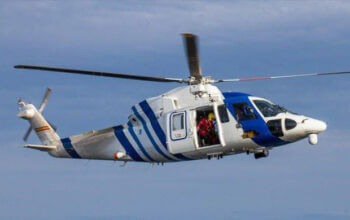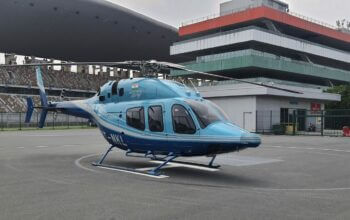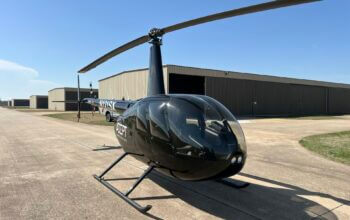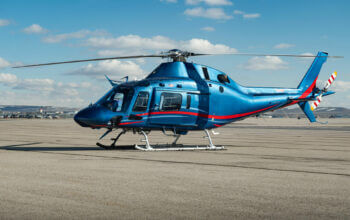Estimated reading time 11 minutes, 33 seconds.
Although Trans Capital Air began operations flying ad-hoc charters in Canada, it has since become known for flying United Nations missions in some of the most difficult conditions and dangerous places in the world.
Jan. 12, 2010: A catastrophic earthquake shattered Haiti. Although exact figures are still uncertain even today, official estimates have stated that more than 220,000 people were killed, 300,000 or more were injured and millions more were left homeless.
Among the many companies around the world that immediately responded with assistance was Canada Trans Capital Air. Although based at Billy Bishop Toronto City Airport on the Toronto Islands, Trans Capital operates charter services on a worldwide basis, using its fleet of nine de Havilland Canada DHC-7 (Dash 7) turboprops.
In Haiti, Trans Capital has been providing charter services to the United Nations since 2005. So, when the earthquake destroyed the UN headquarters in Port-au-Prince, killing mission chief Hedi Annabi, acting commissioner of operations Doug Coates (a Royal Canadian Mounted Police officer), and at least 82 more UN workers, Trans Capital already had people and aircraft on hand.
Fortunately, our people were safe, because we insisted on housing them in structurally sound accommodations, said Antoine Pappalardo, Trans Capital Air president. But, our UN clients were traumatized by the decapitation of their organization and destruction of their facilities. It speaks to the quality of our personnel that they did everything they could to help out and ensure operational continuity. Meanwhile, here in Canada we had medical and relief supplies on their way by Dash 7 within 72 hours.
So, how did a charter company based in Southern Ontario end up flying in some of the toughest areas of the world? It a story that speaks to the determination of Trans Capital Air people and to the flexibility and power of the venerable Dash 7.
Today Canada, Tomorrow the World
Initially, Trans Capital Air began in the mid-1990s as a provider of ad-hoc charter services. Thanks to its Dash 7s, the company served customers as diverse as the Ontario Ministry of Natural Resources (moving forest firefighters), the Canadian Coast Guard (performing Arctic ice patrols), various resource companies (shuttling mining workers) and the Ontario Provincial Police (mobilizing SWAT personnel to remote locations).
Late in that decade, we decided to take a longer-term approach to charter work, said Pappalardo. This meant seeking extended contracts that would provide more constant cash flow for the company, and steady work for our people.
This change in direction soon led Trans Capital to the United Nations, and that organization missions around the world. In particular, Trans Capital Dash 7 fleet after the U.S. military, we are the largest Dash 7 operator in the world, said Pappalardo gave the carrier a distinct edge in winning UN contracts. After all, when it comes to short takeoff and landing (STOL), the ability to operate in a wide range of climates and landing conditions, and just plain ruggedness and reliability, the four-engine Dash 7 is in a class by itself.
We started by providing the UN with Dash 7 service in East Timor [Timor-Leste] in 2001, said Pappalardo. We then embarked on an adventure in Liberia, and worked in Nepal. Our aircraft have also been chartered in the Ivory Coast, Haiti and Afghanistan.
Not Your Average Charter Conditions
It is quite common for Trans Capital Air to carry peacekeepers, aid workers, diplomats and even heads of state in its Dash 7s. But the aircraft can also be stripped of seats or operated in combi mode to haul food rations, medical supplies, machinery, electronics and anything else the UN might require. All told, each Dash 7 can carry 10,000 pounds of freight, 50 passengers or a mix of the two.
We carry anything and everything, said Pappalardo. We also operate in all kinds of conditions, from paved runways, to rough grass fields and rugged dirt strips. De Havilland built so many capabilities into the Dash 7, such as STOL, high wheel clearance and the rugged landing gear strong suspension, that we can land pretty much anywhere.
The Dash 7 ability to fly in rough conditions also helps, said Pappalardo. Because of the places we work, we have to fly in hot and humid conditions, at high altitudes, and over harsh terrain that other aircraft couldn’t handle. Then there dust and dirt, strong winds, and torrential rains. Flying for the UN is no fair-weather commuter hop!
Its People Are Its Assets
Trans Capital Air success in winning and keeping UN contracts is in large part due to its people. We have a crew of truly committed professionals who work for us, from our pilots and ground crew, to attendants and support staff, said Pappalardo. They are the ones who stepped in during the Haiti disaster, and in countless other situations, as well. They are the reason why we can do what we do.
Mindful of how important people are to his company, Pappalardo takes their working conditions very, very seriously. When we set up a base in a new location, I am always the first person on the ground to inspect the living and working accommodations. It is vital that our people have decent and safe places to live and work in, good food, and the necessary resources both to maintain our aircraft and themselves. You can’t expect your staff to give their best if the food is making them sick, or they’ve been without hot water for three days and can’t take a shower, or are isolated from their families due to poor communications.
So, where does Trans Capital find its people? We look around the globe for experienced, mature people who are comfortable being away from home for extended periods of time. I find that people who have flown in the bush are well-suited to this work, as are those who have in-theatre military experience. Such people are hard to find, which is why the company canvases globally for new personnel. And that is why Trans Capital Air is a mini United Nations in its own right.
Becoming a Carrier of Choice
Trans Capital Air combination of planes and people has made it a carrier of choice for the United Nations. Of course, this means the airline staff members have found themselves in some pretty dangerous situations.
A case in point: in March 2011, the Ivory Coast was falling apart following the refusal of defeated president Laurent Gbagbo to turn power over to election winner Alassane Ouattara. The conflicts between the two rivals and their followers turned into violent street battles. Civilians were killed while others fled. Stores and homes were looted. Public safety collapsed.
In response to the crisis, We went into civil war mode, explained Pappalardo. When things came to a head, we evacuated our people by helicopter when we were unable to move our Dash 7 out of the Ivorian military hangar. We had to keep everyone out of the country for 10 days until the situation came under control.
Evacuating Trans Capital staff wasn’t easy: It took three days to arrange for an armed escort and to get our people to the helicopter staging area. That just how dangerous the situation was.
In another instance, after an American evangelical preacher burned a copy of the Koran, protesters in Mazar-e-Sharif, Afghanistan, retaliated on April 1, 2011, by torching the local UN compound, and attacking and killing a number of UN staff members. We were tasked with flying the UN Afghanistan mission leadership to Mazar-e-Sharif following the attack, which was considered to be a very dangerous and unstable place, recalled Pappalardo. We not only did that mission, but followed up by flying in seven empty caskets… and leaving with seven full ones. It was a very emotional day for all of us.
Today, Trans Capital Air Dash 7s continue to serve in Afghanistan and the Ivory Coast, Haiti and anywhere else the United Nations needs reliable, rugged air transport. As new hot spots and calamities occur around the world, you can bet that these Dash 7s will turn up there, as well.
We are proud, as Canadians, to be doing something to help people in some of the toughest areas of the globe, said Pappalardo. We could not achieve any of this without our trusted Dash 7s, and the great people who work on our team, 24 hours a day, 365 days a year.
Notice a spelling mistake or typo?
Click on the button below to send an email to our team and we will get to it as soon as possible.
Report an error or typoHave a story idea you would like to suggest?
Click on the button below to send an email to our team and we will get to it as soon as possible.
Suggest a story












Bonjour Antoine, que de bons souvenirs, Guyane 1999…et aussi une évacuation en hélico pour l’equipage